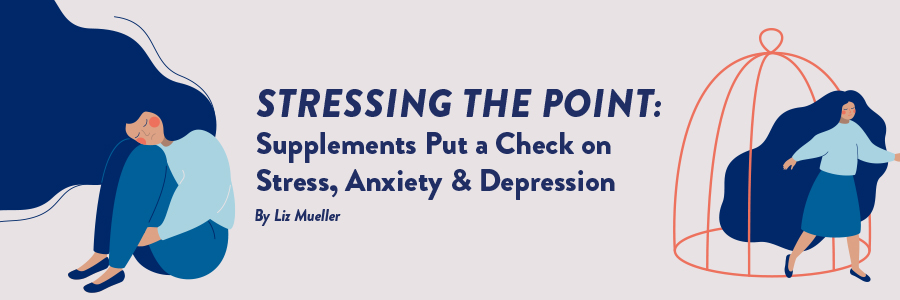


Sign-up for {N}power to get exclusive discounts, newsletters, members-only features, and more!

The world we live in is downright stressful. It’s stressful just thinking about how stressful things have become. While stress is a part of life, when it runs unchecked and unabated, it can wreak havoc on our lives, interfering with everyday tasks, our relationships, and our jobs. It can also damage the delicate structures of our brains and lead to anxiety and depression. In addition to meditation, yoga, and spending time outside in nature—all the things we know are helpful to reduce stress, but don’t always do—specific dietary supplements can help the body and mind remain resilient during times of stress, and are actually necessary to ensure that we don’t feel so stressed in the first place. Magnesium, B vitamins, rhodiola, bacopa, and phosphatidylserine (PS) are crucial for nutritionally supporting our bodies and brains when we are stressed.

Stressed? Mag up! Magnesium is magnificent for calming frayed nerves, lulling you to sleep, eliminating muscle cramps, and alleviating headaches. Those can all be signs of low magnesium levels, which studies show leads to depression and anxiety-like symptoms, in addition to increased cortisol levels, sleep disturbances, and increased inflammation.1 2 It’s even more crucial to supplement with magnesium when under chronic and long-term stress and anxiety. Why? Because when stressed, your adrenal glands release the stress hormones adrenaline and cortisol into your bloodstream, which causes an increase in the loss of magnesium through urine, eventually depleting body stores.3
One form of magnesium, magnesium threonate (MgT), is especially helpful for some of the mood issues experienced when stressed. Researchers discovered that elevating magnesium levels in the brain promoted synapse density and synaptogenesis—the formation of synapses between neurons—in regions critical to cognitive abilities and emotions.4 Scientists identified MgT as a bioavailable compound that effectively crosses the blood-brain barrier, elevating brain magnesium, and thereby improving brain function and reducing depression and anxiety.5 6 7 MgT has also been demonstrated to enhance learning, memory, and quality of sleep.8 If you’re suffering from a brain imbalance, or are just needing a little extra support from the stresses of life (aren’t we all?), discovering this life-altering mineral might be the missing link.
Taking a b-complex vitamin is a terrific approach to covering your bases for total-body health, including brain health, during times of stress. Studies indicate that B vitamins play an important role in alleviating depression and anxiety. Clinical signs of insufficient intake of B vitamins are mood changes, insomnia, changes in appetite, and sugar cravings.9 One B vitamin, thiamine (B1), is especially important if you suffer from brain fog. Your brain loves energy, as do the rest of your nerves, and good old vitamin B1 is a cofactor in a zillion energetic reactions. Thiamine deficiency results in a decrease in cerebral glucose utilization and results in mitochondrial damage. Electron microscopy shows disintegrating mitochondria, chromatin clumping, and swelling of degenerating neurons. Yikes! Even if the bigger words are mysterious, B1 deficiency is clearly very bad—dying, rotting neurons and a tangled ruin of your precious brain. Thus, it is no wonder that thiamine deficiency symptoms include mood disorders, anxiety, insomnia, restlessness, and night terrors. One study found that taking 50 mg of B1 daily “was associated with reports of being more clearheaded, composed, and energetic.”11 12
Just roll with it with rhodiola! This adaptogenic herb has been used to treat anxiety, fatigue, and depression for centuries.13 While it may be foreign to some, the studies speak for themselves. One examined the effects of taking 400 mg of rhodiola extract per day for four weeks in subjects with life- and work-related stress. After just three days, they found significant improvements in markers of stress, such as fatigue, exhaustion, and anxiety. In another study investigating the effects of stress-related burnout, rhodiola improved many participants’ symptoms, including stress and depression.15 Rhodiola works with your body to adapt to stress and increases your body’s resistance to stress, allowing you to better cope during stressful times.16
A lesser-known nutrient worth noting is BACOPA, a nootropic herb, a type of supplement that’s taken for its positive effects on the brain. Supplementation with bacopa has been shown to reduce anxiety and improve mood, increase memory, and is used as a general cognitive enhancer. 17 18 Bacopa is known to affect the neurotransmitters dopamine, serotonin, acetylcholine, and gammaaminobutyric acid (GABA).19 These neurotransmitters are involved in memory, mood, and anxiety.
P.S., one more thing. Phosphatidylserine (ps), pronounced phos·pha·ti·dyl·se( )r-ēn, is a phospholipid (a type of lipid, or fat, that is an integral part of cell membranes) and is a component of the 300 billion cells that form your brain. A 2014 study found that PS normalized stress-related biomarkers—namely cortisol, the “stress hormone”—in chronically stressed individuals. 20 Another 2014 double-blind study showed that short-term PS supplementation improved daily functioning, mental health, and self-reported general wellbeing in older individuals with Alzheimer’s and dementia.21 In fact, memory issues related to chronic stress, the natural aging process, mental health conditions, and insomnia have all been shown to be improved by supplementation with PS.22 23 24
While stress is inevitable, you can make your body and mind more resilient and reduce the harmful effects of stress with stress relieving supplements. March on with mighty magnesium, bolster your health with beneficial B vitamins, roll with the punches with rhodiola, find your balance with bacopa, and push through life’s stresses with phosphatidylserine.
You have the power to make a positive change in the world by tamping down the stress in your life.



Sign-up for {N}power to get exclusive discounts, newsletters, members-only features, and more!